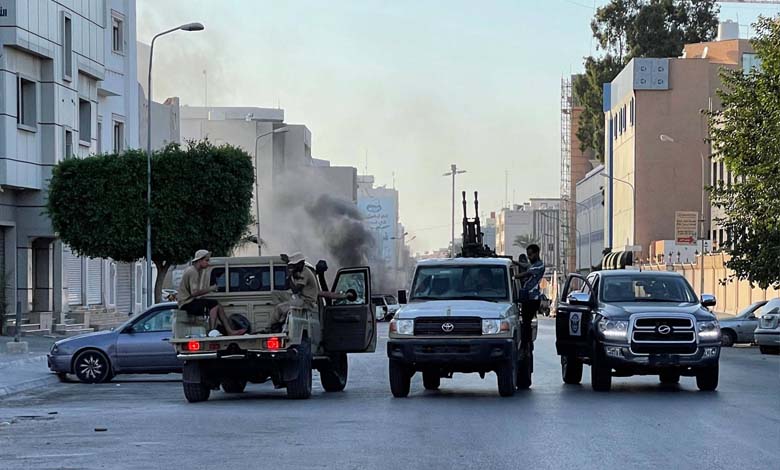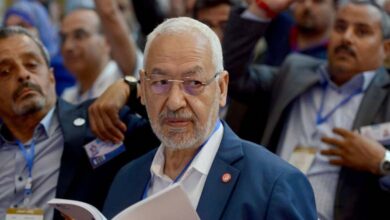Militia Power: The Kidnapping of an Intelligence Officer Denies Europe Access to Libyan Gas

The chaos from militia control over affairs in western Libya has reached a critical stage, as some have shut off a gas valve heading to Europe in protest over the kidnapping of an officer from Libya’s General Intelligence Service.
-
The suffering of Libyan society from the presence and control of militias over decision-making in western Libya – Details
-
Western Libyan militias continue their terrorism to destabilize the state
Local Libyan sources confirmed that protesters from the Western Mountain region blocked the Batn al-Jabal road between Nalut and Tripoli at the Zintan intersection, setting car tires on fire to protest the continued abduction of Mustafa Al-Wuhayshi, director of central security in Libya’s intelligence service, who has been held for five days.
In an escalation of the protest, demonstrators closed the gas valve connecting Libya to Europe in the Rayayna area, giving the government one day to secure the release of Al-Wuhayshi, who was abducted last Thursday in Tripoli.
-
Militias Fight in Libyan Zawiya; Calls for International Protection of Civilians
-
Libyan candidates talk and militias mobilize as electoral process collapse
No group has yet claimed responsibility for the kidnapping. Libya has experienced years of abductions of public employees, judicial workers, and parliament members, with militias often using these as pressure tactics to halt investigations into corruption cases involving militia members or figures close to them.
Energy revenues make up about 95% of Libya’s budget, and rival factions competing for power since 2011 have periodically used oil field closures as leverage to achieve their objectives.
-
The Libyan Eastern Government Searches for Abducted Deputy
-
European-Libyan Cooperation to Secure Libyan Borders with Tunisia
Libya recently resumed oil production after weeks of shutdown, following a resolution to a crisis over appointments in the central bank leadership that had divided institutions in eastern and western Libya last month, with some factions using oil field closures at the height of the crisis.
The Context of the Kidnapping
Militias abducted Major General Mustafa Ali Al-Wuhayshi, director of central security in the General Intelligence Service, the nation’s highest security body, detaining him unlawfully, with his fate still unknown.
-
Is Libya Becoming a Hub for Exporting Armed Militias to Africa?
-
Clashes Between Militias in Tripoli Mar Eid Atmosphere
The Libyan intelligence service condemned Al-Wuhayshi’s kidnapping, assault, and illegal detention, citing risks to his safety, distress to his family, damage to the agency, and threats to its personnel, according to a statement released Thursday.
The intelligence service stated that this act constitutes a criminal offense punishable by law and that Libyan justice would hold the perpetrators accountable, warning against the continued unlawful detention of the kidnapped officer or threats to his safety. The service pledged to make every effort to secure his safe release.
-
Militias Share Smuggling Cake at Ras Jedir Crossing
-
Libyan Muslim Brotherhoods Sense Danger… Details
Regarding the reason for the abduction, the statement noted that the officer “was kidnapped in connection with ongoing investigations into several cases impacting Libyan national security, some of which are still under review,” without further details.
Militia Impact Over 13 Years
Following the fall of President Muammar Gaddafi’s regime in 2011, Libya has seen the rise of armed militias that have seized control of numerous official institutions.
-
Complications Hindering the Evacuation of Militias from Tripoli
-
Washington does not want Moscow to dominate the Libyan scene
This phenomenon subsided in eastern Libya thanks to battles led by the Libyan National Army against these militias since 2014, but it remains concentrated in western Libya, where militias have found support from certain local political entities and some countries.
The western region endures a state of security chaos due to the spread of militias outside state control, which has led to severe crimes, assassinations, kidnappings, illegal detentions, and impunity, as these militias draw strength from their weapons and leaders who have reached high positions within institutions.
-
The Libyan Scene is Turbulent… What Comes after the Clashes in Tripoli?
-
Violent Clashes Between Major Factions Threaten Stability in the Libyan Capital
The prevalence of militias and the appeal of joining them in the absence of law have also contributed to widespread weapon proliferation, with more than 29 million firearms in circulation outside of state control.












